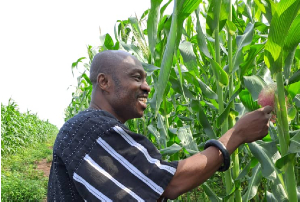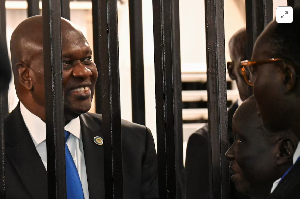The quickest way out of Africa’s economic woes is through agriculture, Dr Rufaro Madakadze, Programme Officer for Training and Education at AGRA, has said.
According to her, although majority of Africans are into agriculture, with an increase in productivity and incomes Africa can come out of its economic misery.
“In Africa we have tried the oil, it has not worked; we have tried the minerals, it has not worked, but with agriculture it involves a lot more people. Over 70 per cent of the people in Africa are engaged in agriculture, so if we have even a small increase in productivity and incomes of that 70 per cent, we can transform Africa like this very quickly,” she said in an interview with Moro Awudu on the Executive Breakfast Show (EBS) on Class91.3FM on Tuesday, 6 June 2017.
Touching on why Africa is economically behind despite the fact that majority of its people are into agriculture, Dr Madakadze was of the view that education and investments by governments in the sector would turn the fortunes of farmers round for the better.
To help modernise agriculture, she noted that AGRA was training farmers through the West Africa Centre for Crop Improvement (WACCI) which is celebrating its 10th anniversary this year under the theme: The march towards food and nutrition security in sub-Saharan Africa.
“This is why we are training people, this is why we are funding people in Africa to solve Africa’s problems. What has been happening before was that people were trained far and then come back to the continent to learn to adapt. But with the system we are using, working with WACCI, we are training people to address the farmer’s problem in the region. It is actually the solution to solving the problem of agriculture,” she explained.
To solve the problems of agriculture in Africa, Dr Madakadze urged governments “to be serious in investing in agriculture, not only in improved technologies but in access to market, in access to finance, and to make sure that the smallholder farmers have absolutely everything they need, adding: “If we do that we will change it.”
She disagreed that the youth had lost interest in agriculture. According to her the trend was changing as more youth were rather getting engaged in farming.
Telling a short story, she said: “Two weeks ago I was in South Africa at a meeting for Union of Farmer Organisations and there are exciting things happening. They had farmers who were 34 years and younger as their members. The one thing that struck me was they are actually convinced that the only way to make money sustainably without losing a job is if you farm, and these farmers are making millions.
“We have farmers from Tanzania, Mozambique, Malawi, Angola, Madagascar, so the narrative is changing and we also know of young people who are running seed companies in Ghana and Malawi and making money and employing other young people. The only thing we can do is to showcase the success of the young people to show that agriculture is a business you can do, it’s a business you can live on, you can make money and change the lot around you.”
General News of Tuesday, 6 June 2017
Source: classfmonline.com













